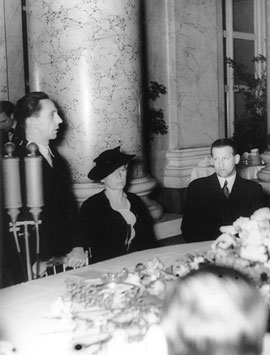An insightful commentary about Nazi looting of Polish collections by Dr. Robert Kudelsky of Warsaw serves as a stark reminder of the criminal role played by art historians in the wartime plunder of Europe. Most continued to ply their trade in the postwar era, unmolested by Allied authorities or by the governments of their own countries. In fact, the various Allied collecting points relied on art historians who had once served the Reich for help in identifying and locating looted works of art in the various occupation zones of Germany and Austria.
 |
| Kajetan Mühlmann Source: Jüdisches Museum Berlin, Raub und Restitution |
“Controversies concerning art restitution are an important factor in current European diplomacy. In some cases, Austrian authorities are still loath to reveal the shameful issues of their history and the activities of art historians who, during World War II, actively participated in the plunder of Polish treasures. This attitude resulted in the fact that many scholars and museum executives engaged in these pursuits remain anonymous. Most art historians who took part in the looting of European museums and private collections were not accused of robbery. Although Dr. Kajetan Mühlmann did spend several months in Allied prisons, his punishment was by no means commensurate with the damage he inflicted on the cultural heritage of Europe. After the war, almost all of the art historians who cooperated with the Nazis in the looting of art took up academic and scientific activities, advancing their careers without difficulty. Joseph Muhlmann as a director of one of the leading Austrian cultural institutions is the best example. The only way to achieve some progress in resolving this tragic legacy [of the Second World War] is strengthening international cooperation involving both government and private institutions, as well as leading experts in the field…”
Let’s not forget that the Muhlmann brothers also plied their trade in the heart of Paris at the rue Mayran from which they shipped hundreds of pieces appropriated through various means in and around Paris to their paymasters in Austria. Coincidentally, the Schenker shipping company was also located… in the rue Mayran.